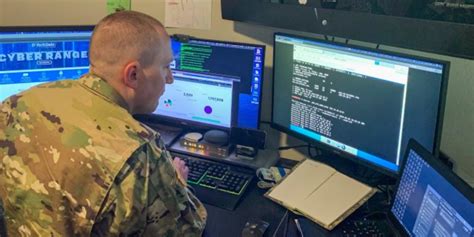As the world becomes increasingly reliant on digital technologies, the demand for skilled information technology (IT) security specialists has never been higher. These professionals play a critical role in protecting computer systems, networks, and sensitive data from unauthorized access, use, disclosure, disruption, modification, or destruction. The role of an IT security specialist is multifaceted, requiring a deep understanding of computer systems, networks, and cybersecurity principles, as well as the ability to stay ahead of emerging threats and vulnerabilities.
According to the Bureau of Labor Statistics (BLS), employment of information security analysts, which includes IT security specialists, is projected to grow 31% from 2020 to 2030, much faster than the average for all occupations. This growth is driven by the increasing reliance on digital technologies, the rising incidence of cyberattacks, and the need for organizations to protect their sensitive data and systems. The median annual salary for information security analysts was $102,600 in May 2020, with the top 10% earning more than $163,300.
Key Points
- The demand for IT security specialists is driven by the increasing reliance on digital technologies and the rising incidence of cyberattacks.
- IT security specialists require a deep understanding of computer systems, networks, and cybersecurity principles.
- The role of an IT security specialist involves protecting computer systems, networks, and sensitive data from unauthorized access, use, disclosure, disruption, modification, or destruction.
- Employment of information security analysts, including IT security specialists, is projected to grow 31% from 2020 to 2030.
- The median annual salary for information security analysts was $102,600 in May 2020, with the top 10% earning more than $163,300.
Roles and Responsibilities of IT Security Specialists

IT security specialists are responsible for designing, implementing, and maintaining the security infrastructure of an organization. This includes installing and configuring firewalls, intrusion detection systems, and other security devices, as well as developing and enforcing security policies and procedures. They must also stay up-to-date with the latest security threats and vulnerabilities, and develop strategies to mitigate them.
Some common roles and responsibilities of IT security specialists include:
- Conducting risk assessments and vulnerability testing to identify potential security threats
- Developing and implementing security policies and procedures
- Installing and configuring security devices, such as firewalls and intrusion detection systems
- Monitoring and analyzing security logs to detect and respond to security incidents
- Developing and conducting security awareness training for employees
- Collaborating with other teams, such as incident response and disaster recovery, to ensure comprehensive security coverage
Skills and Qualifications Required
To be successful as an IT security specialist, one must possess a combination of technical, business, and soft skills. Some of the key skills and qualifications required include:
- Bachelor's degree in computer science, information assurance, or a related field
- Strong understanding of computer systems, networks, and cybersecurity principles
- Experience with security devices, such as firewalls and intrusion detection systems
- Knowledge of security frameworks and regulations, such as NIST and HIPAA
- Strong analytical and problem-solving skills
- Excellent communication and collaboration skills
- Ability to stay up-to-date with the latest security threats and vulnerabilities
| Security Certification | Description |
|---|---|
| CompTIA Security+ | Entry-level certification covering security concepts, risk management, and data protection |
| Cisco CCNA Security | Intermediate-level certification covering network security, firewalls, and VPNs |
| CISSP | Advanced-level certification covering security and risk management, asset security, and software development security |

Industry Trends and Emerging Technologies

The field of IT security is constantly evolving, with new threats and vulnerabilities emerging every day. Some of the current industry trends and emerging technologies include:
- Cloud security: As more organizations move their data and applications to the cloud, cloud security has become a major concern.
- Artificial intelligence and machine learning: AI and ML are being used to improve security incident detection and response, as well as to develop more sophisticated security threats.
- Internet of Things (IoT) security: The increasing use of IoT devices has created new security risks, as these devices are often vulnerable to hacking and other forms of exploitation.
- DevSecOps: This approach integrates security into the development and operations processes, ensuring that security is considered throughout the entire software development lifecycle.
Challenges and Opportunities
Despite the many rewards of a career as an IT security specialist, there are also challenges and opportunities that must be considered. Some of the key challenges include:
- Staying up-to-date with the latest security threats and vulnerabilities
- Managing the complexity of modern security systems and devices
- Communicating security risks and threats to non-technical stakeholders
- Balancing security with business needs and priorities
On the other hand, some of the key opportunities include:
- High demand and job security
- Competitive salaries and benefits
- Opportunities for advancement and professional growth
- The chance to make a real difference in protecting organizations and individuals from cyber threats
What is the primary role of an IT security specialist?
+The primary role of an IT security specialist is to design, implement, and maintain the security infrastructure of an organization, protecting computer systems, networks, and sensitive data from unauthorized access, use, disclosure, disruption, modification, or destruction.
What are some common certifications for IT security specialists?
+Some common certifications for IT security specialists include CompTIA Security+, Cisco CCNA Security, and CISSP.
What are some emerging trends and technologies in the field of IT security?
+Some emerging trends and technologies in the field of IT security include cloud security, artificial intelligence and machine learning, Internet of Things (IoT) security, and DevSecOps.



